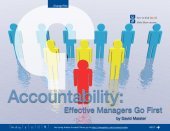 |
Accountability: Effective Managers go First |
After attending one of my seminars, Jay Bertram, president of the Toronto office of TBWA, the global advertising agency, returned to his office and immediately asked all his people to evaluate their overall job satisfaction, their feelings about the office and (most critically) their overall rating of him as a manager.
Then he dropped the biggest bombshell: as I had recommended, he announced to all his staff that if he did not improve in their ratings across all three measures - by 20 percent within one year - he would resign! He later wrote to me: I was thoroughly moved by your passionate plea for senior management accountability. I want to thank you for encouraging me to be a better manager. It is because of you that I am making a real difference for my employees. I have never been happier and more productive. I have just completed the follow-up survey, and my scores have improved.
The results have been terrific. The office continues to grow rapidly, and our employee satisfaction results are all above the corporate averages. We have become a better management team at having direct conversations with our employees, and we face issues rather than avoid them. I believe everyone in the office has become more accountable. They look to what they have done or contributed before complaining about others.
And what had I said that made Jay act on all this? He told me:
You challenged me to be personally accountable for my role as a manager. It struck home when you said that many managers are seen by their people as lying - to others and to themselves - when they publicly proclaim their commitment to standards of excellence or missions for their organization and do not follow through. You gave me the reassurance that living up to my standards, and being prepared to be personally accountable for them, was the right thing to do.
Every manager has room for significant improvement. We must challenge ourselves to stretch past our comfort zone by stating a goal that will generate a real change in our own behavior, for all to see and experience. Managing is truly a race with no finish line. We must keep moving, learning, listening, acting, and growing if we are to fulfill our role. Jay described my recommendation as “the right thing to do,” and maybe it was, but in my seminar, I hadn’t been trying to make a moral point but a practical, pragmatic one. When trying to get an organization to move, there is nothing more powerful than a manager who is prepared to lead - by going first! We cannot expect an organization to raise its game, change its direction or pursue new ambitious goals and strategies by saying “Charge! I want all of you, the troops, to climb out of your foxholes and go put yourselves in harm’s way.” Realistically, that’s unlikely to work. Instead of saying “Charge!”, we need to say, “Follow me,” energizing others through our own behavior.
In any organization, regardless of its purpose, scale or location, there is great power that comes from creating a culture of accountability. When people in an organization can depend upon the fact that everyone else will keep their word and perform the duties and tasks they have accepted, more will get done with less explicit oversight. People will feel a heightened sense of responsibility and will act on it. And if we want others to perform their roles to higher levels, we must ensure that they know and believe that we are truly being held responsible for performing our role - the managerial role - effectively.
A Specific Recommendation
There are four steps toward making yourself accountable, and in turn, improving your organization:
Step One:
Examine the specific statements below, one by one, while putting yourself in the shoes of your employees. Ask yourself whether or not doing well on each of these is an important part of your role - is it something you are supposed to be good at.
You, My Manager ...
- Act and live by the principles you advocate
- Act as a role model that people want to copy
- Are a person of integrity
- Enforce the company values
- Are “part of the team” as opposed to being the boss, separate and detached.
- Cause me to stretch for performance goals
- Are concerned about long-term issues, not just short-term profits
- Provide constructive feedback that helps me improve my performance
- Are a source of creative ideas about our business
- Help me to grow and develop
- Make me feel that I am a member of a well-functioning team
- Emphasize cooperation as opposed to competitiveness between work groups
- Are prompt in dealing with underperformance and underperformers
- Keep me informed about the things I need to know to perform my role properly
- Encourage me to initiate tasks or projects I think are important
- Are good at keeping down the level of politics and politicking
- Are more often encouraging than critical
- Are fair in dealings with employees
- Are consultative in your decision making
- Act more like a coach than a boss
- Are publicly generous with credit
- Are effective in listening
Eliminate immediately any questions that you think are idealistic, unimportant or not part of your role. Add back in any critical things you think I have missed in order to be good at performing your role. Take this first step seriously and slowly. The purpose is to think through what you really need to be good at if you are to be an effective manager. You have to ask yourself what your personal performance standards really are.
Notice that we are trying to uncover performance standards for ourselves as managers that will predict the future performance of the organizations for which we are responsible. Most organizations will already have in place metrics that record how well managers are doing as judged by a retrospective look at our group’s results in the latest reporting period. Our purpose here is different. We are asking ourselves: “What would I, as a manager, have to do well to cause my group to perform better in the future? What do I have to do well at to really make a difference?”
Step Two:
- Circulate the final questionnaire you develop, asking everyone you deal with in your organization to evaluate you on the specific dimensions you have decided you should be good at. Have the surveys returned to and tabulated by a third party (inside or outside your organization) to give everyone the comfort and confidence that the individual responses will be treated confidentially.
Step Three:
- PUBLISH the average ratings you receive to everyone in your organization.
- Everyone - administrative staff included
Step Four:
- Call a meeting of those you manage and give the following speech:
“Here’s what you think about me. Don’t expect me to be perfect the first time we try this. Perfection is not a standard you can hold me to, and it’s not a standard anyone can hold any one of you to.
“What is more, don’t expect me to be perfect a year from now when we repeat this, just as I will not expect you to be perfect. I don’t think that’s a realistic standard for any of us. “But here’s my promise to you, right here, right now. If I have not improved in my performance against the agreed-upon standards that are embedded in my role, then I will step down from my role as the manager of the group. You do have a right to expect that I will get better at the things that are my responsibility. And that’s exactly what I’m going to ask of you!”
Now THAT’S going first! Can you imagine the impact?
Download full article for more...
Enjoy this article? Feel free to share your comment, idea or opinion in the comment section
Related Articles

|
Applying Critical Thinking Skills in the WorkplaceIn the 2018 Future of Jobs Report published by the World Economic Forum, critical thinking been identified as one of the skills that is increasingly required in the workplace. This report underscores the relevance of critical thinking skills at work. As simple as the term may seem, many people do no [Read more]
|
Posted: 8 years ago |

|
Financial Planning – Is It for Me?As Fitzhugh Dodson said, "Without goals, and plans to reach them, you are like a ship that has set sail with no destination." This saying is particularly true when it comes to financial planning. Except you win a lottery or run into an expected or unexpected inheritance (both of which may [Read more]
|
Posted: 3 years ago |

|
Making the Most of Year 2024 - A ContemplationAs we are about to get into June, signifying the end of the first half of the year, it's a perfect time to reflect on how to turn the rest of 2024 into something truly fulfilling. Depending on the level of achievement of your set goals for the year, we have put together some ideas to guide your [Read more]
|
Posted: 2 years ago |


